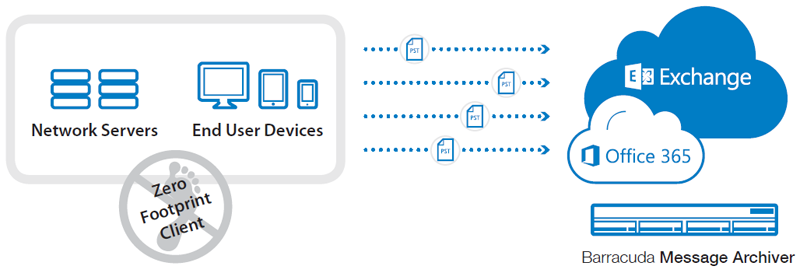
Barracuda Networks PST Enterprise
Locate PST Files, Regain Control Over Them, and Manage Them Effectively and Efficiently

Sorry, this product is no longer available, please contact us for a replacement.
 Barracuda PST Enterprise Overview:
Barracuda PST Enterprise Overview:
PST Enterprise enables IT administrators to regain control over email data stored by end users in individual PST files and scattered across their organization. It can eliminate the risks associated with PST files, as well as reducing ongoing costs and supporting IT requirements for Compliance and eDiscovery.
The Barracuda Advantage
- Zero Footprint Client minimizes impact on end users
- Parallel Processing avoids throttling & improves performance
- Minimizes network impact by migration directly to mailbox
- Determines ownership intelligently based on content
- Discovers all PST files regardless of location and state
- Selective processing migrates only data that is needed
Product Spotlight
- Fully automated and centrally managed operation
- Highly scalable and suitable for enterprise-level use
- Wide choice of PST processing options
- Disconnects and deletes files after migration
- Supports Office 365 as well as all recent Exchange versions
- Self-service portal allows users to determine processing
Complete PST Management for Your Organization
PST Enterprise enables IT administrators to regain control over email data stored within PST files scattered across their organization.
It can eliminate the risks associated with PST files, as well as reduce ongoing costs and support IT requirements for Compliance and eDiscovery.
PST Enterprise will discover PST files on network servers and end user systems, and migrate this data to a secure location such as Exchange, Office 365 or Barracuda Message Archiver.
PST files pose a significant challenge to many organizations today. Often used by end users as personal archives for email, they are scattered across end user systems and network storage and are not managed consistently or effectively – if they are managed at all.
They constitute a hidden threat because they can exist outside the corporate environment, are difficult to discover and even more difficult to search. As they are not usually backed up, they leave end users and the business vulnerable to data loss.
Because PST files typically do not comply with an organization's information management and compliance policies they also represent an ongoing legal risk and will complicate any eDiscovery processes.
Recent versions of Microsoft Exchange and Office 365 now provide more effective capabilities to retain and manage email centrally so end users no longer have a need to store email locally within PST files. However some users continue to rely on PST files and there may also be a lot of existing data within legacy PST files that needs to be migrated into the new environment.
PST Enterprise addresses this by discovering PST files wherever they are located across the organization and then migrating the data contained within back into their corporate email environment. It is a highly scalable solution that is suitable for the largest enterprises as well as smaller organizations.
Regain control of all email across the organizationIdentify all email stored across the organization and manage appropriately so that it is secure and readily available. Centralize storage and backup, or better still, eliminate the use of PST files to regain control of data and reduce the support overhead of these unreliable files. |
|
Reduce legal and corporate risksMake all information visible and accessible so that in the event of an investigation or litigation, all data across the organization can be searched. Protect against end user data loss or theft by either controlling PST files or migrating the data needed from them and deleting them. |
|
Ensure data compliance and securityImplement robust data retention and defensible deletion policies to reduce costs and ensure compliance with any relevant government and corporate information management policies. Centralizing the information within PST files will help enable discovery and investigative requests. |
Pricing Notes:
- Pricing and product availability subject to change without notice.


 Ensure Compliance and Information Security
Ensure Compliance and Information Security